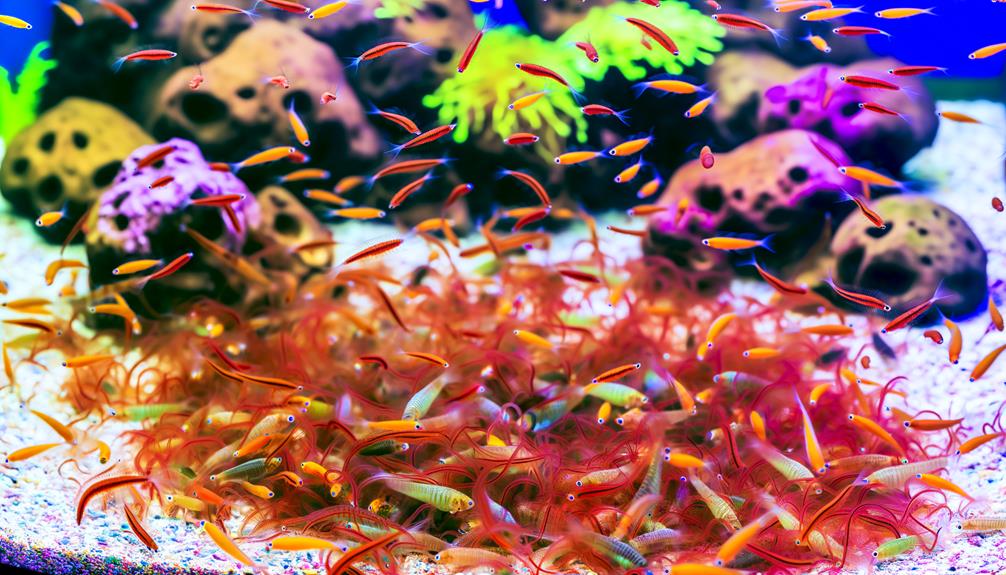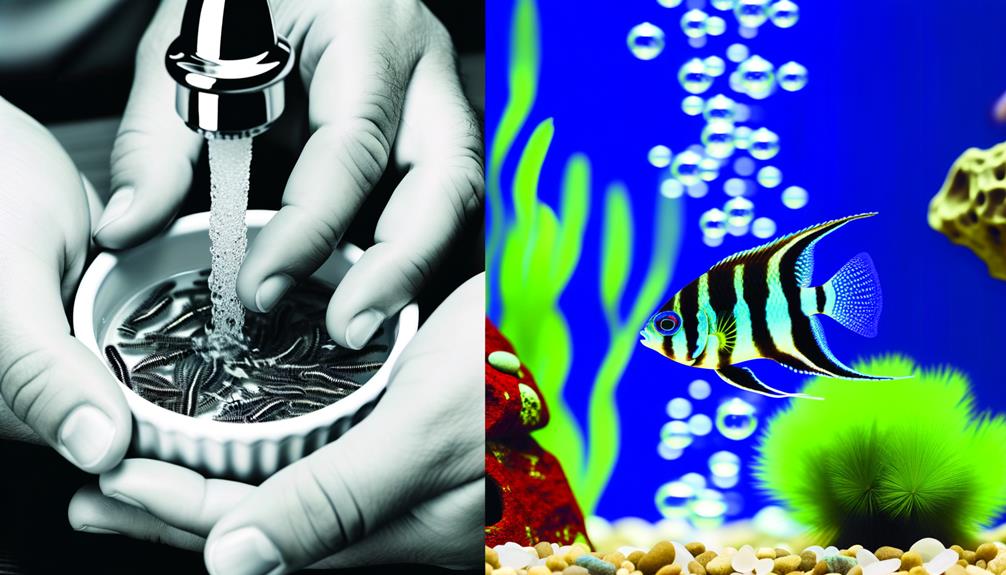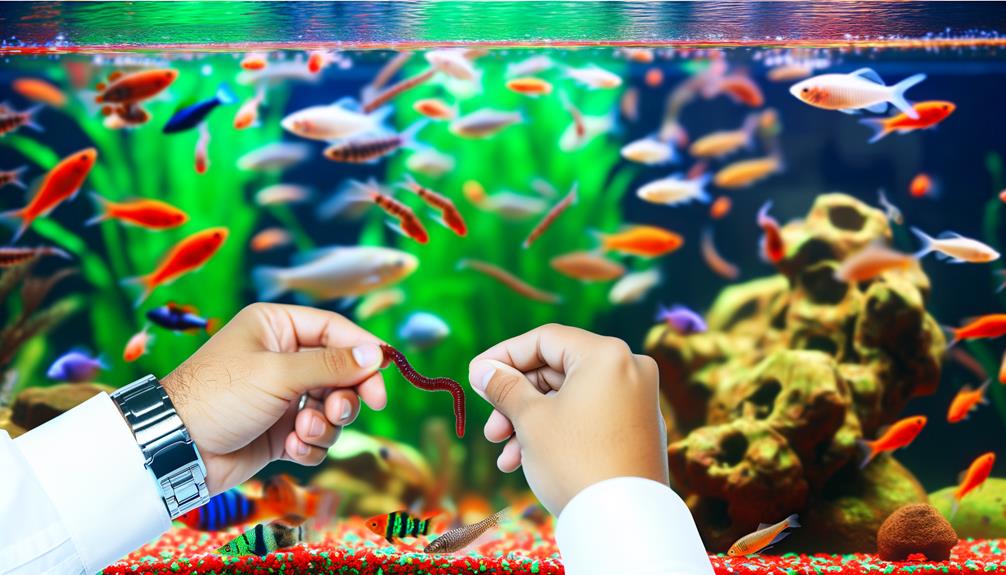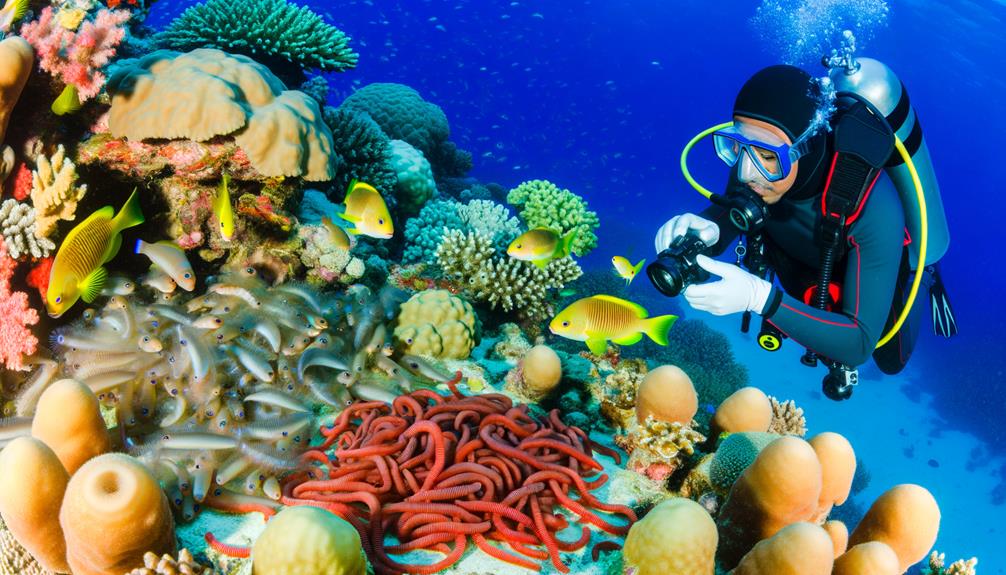The practice of feeding bloodworms to saltwater fish is an area that warrants further exploration. While bloodworms are frequently used as a dietary component for freshwater species, their applicability in a marine environment has been a subject of debate.
The fundamental issue lies in the potential health risks posed by freshwater organisms to marine fish, including the accumulation of marine fats. This could lead to a pertinent question – should aquarists consider alternatives such as brine worms or PE mysis shrimp that may provide better nutrition and safety?
A closer examination of this complex conundrum could yield intriguing insights.
Key Takeaways
- While bloodworms are protein-rich, they may be hard for saltwater fish to digest due to their freshwater fats.
- Feeding bloodworms to marine fish should be done sparingly and with caution as they can cause health risks.
- Alternatives like brine shrimp and mysis shrimp are better suited for marine fish due to similar nutritional benefits without the risks.
- A balanced and diverse diet including marine fats is crucial for marine fish health, which may not be adequately provided by bloodworms.
Understanding Bloodworms
In the realm of aquaculture, bloodworms, a type of larvae frequently utilized as fish feed, play a crucial role due to their high protein content and ability to lure even the most discerning of eaters. These larvae are commonly used as food for both freshwater and marine fish, offering a nutritional feast that not only satiates but also nourishes.
Bloodworms are particularly beneficial for marine fish that are finicky eaters. Their unique flavor and texture can be irresistible, making them an excellent supplement to the regular diet. These worms can be served whole or chopped into smaller pieces, depending on the size and preference of the fish. However, despite their nutritional advantages, bloodworms should not be considered as the primary food source for marine fish.
While they provide a high level of protein, these worms lack certain marine fats essential to the health of oceanic species. Furthermore, the presence of Thiaminase, an anti-vitamin found in some freshwater fish, can affect the efficacy of Thiamine in fish health. Therefore, while bloodworms can be fed to saltwater fish, they should be given in moderation and not as a replacement for a balanced, marine-specific diet.
Nutritional Value of Bloodworms
Offering a protein-packed banquet, bloodworms serve as a rich source of essential nutrients, making them a valuable dietary supplement for saltwater fish. The high protein content aids in the growth and repair of tissues, while the presence of essential nutrients supports overall health and wellbeing.
However, it is important to note that bloodworms should be considered a treat, not a primary dietary staple. Though rich in proteins and nutrients, they lack marine fats essential for the optimal health of saltwater species. To that end, the diet should be supplemented with other marine-based food items.
Despite their nutritional value, the presence of Thiaminase, an anti-vitamin found in some freshwater fish, can potentially affect the effectiveness of Thiamine in saltwater fish when fed bloodworms. This underscores the importance of moderation in feeding these to saltwater fish.
Here's a snapshot of the nutritional value of bloodworms:
| Nutrient | Average Amount | Importance |
|---|---|---|
| Protein | High | Aids in growth and tissue repair |
| Nutrients | Essential | Supports overall health |
| Fats | Low | Insufficient for optimal health of marine species |
| Thiaminase | Present | Can affect Thiamine effectiveness |
Bloodworms in a Saltwater Aquarium

While bloodworms are a nutritious supplement, their suitability for marine fish in a saltwater aquarium is questionable due to potential health risks and digestive issues associated with freshwater fats. This concern arises due to the natural habitat of bloodworms, which is freshwater, as opposed to the marine environment of saltwater aquarium fish.
In the context of a marine tank, certain factors must be considered:
- The differing fat composition in freshwater and saltwater organisms: Freshwater fats may be hard for marine fish to digest, potentially leading to health problems.
- The nature of bloodworms as a food source: They are quite large and meaty, and can prove problematic for marine fish, which may have difficulty consuming and digesting them.
- The availability of alternatives: Marine fish can be fed alternatives to bloodworms, such as brine shrimp and mysis shrimp, which provide similar nutritional benefits without the associated risks.
If you choose to feed your fish frozen bloodworms, it should be done sparingly and with caution due to these potential issues. It's crucial to prioritize a balanced diet for your marine fish to ensure their overall health and well-being.
Risks of Feeding Bloodworms
The decision to feed bloodworms to marine fish carries notable risks, particularly due to the potential health implications of introducing freshwater fats into a saltwater diet. These fats, native to the bloodworms' freshwater habitats, can lead to health issues when consumed by marine fish adapted to a saltwater diet. The accumulation of these alien fats can be detrimental, potentially leading to premature death in marine species.
Large meaty foods like bloodworms can also pose a significant risk to the digestive systems of marine fish. The size and consistency of bloodworms may not be compatible with the digestive mechanisms of some marine species, potentially leading to discomfort, digestive complications, or even blockages.
Moreover, while bloodworms might seem a tempting choice due to their high protein content, they aren't the best nutritional option for marine fish. Other feed options such as brine worms or nutrient-rich foods like PE mysis shrimp provide a more balanced diet, benefitting the overall health and longevity of marine fish. Therefore, while bloodworms can be included in marine fish diets, their potential risks necessitate careful consideration and moderation.
Preparing Bloodworms for Fish

In feeding saltwater fish with bloodworms, proper preparation methods are essential to mitigate potential risks and maximize the nutritional benefits of this supplementary food source. These methods not only ensure the health of both freshwater and saltwater fish but also maintain the quality of their aquatic environment.
Here are three essential steps in preparing bloodworms for fish:
- Thawing: Bloodworms should be thawed in a small container of tank water. This step helps to bring them to a suitable temperature for consumption by the fish.
- Rinsing: After thawing, bloodworms must be rinsed thoroughly to remove any excess nutrients. This practice is crucial to prevent potential pollution of the tank water.
- Sizing: Depending on the size of the fish, bloodworms may need to be chopped into smaller pieces. This step prevents overfeeding and makes the worms more manageable for smaller fish species.
Remember to feed bloodworms sparingly and as a supplement to the fish's main diet. It's essential to remove any uneaten bloodworms from the tank post-feeding to maintain water quality. By adhering to these guidelines, you can provide a nutritionally balanced diet for your saltwater fish.
Alternatives to Bloodworms
Although bloodworms serve as a beneficial supplement, fish owners may consider alternatives such as brine worms and PE mysis shrimp, which can provide a higher nutritional value and maintain the health of saltwater fish effectively. Unlike bloodworms, brine worms and PE mysis shrimp are rich in essential nutrients needed for the health of marine fish.
To further emphasize, consider the following table comparing the nutritional value of these alternatives:
| Food Type | Nutritional Value | Suitability for Saltwater Fish |
|---|---|---|
| Brine Worms | High | Ideal |
| PE Mysis Shrimp | High | Ideal |
| Large Meaty Foods | Low | Not Ideal |
| Bloodworms | Moderate | Supplemental Only |
| Varied Diet (including Brine worms & PE mysis) | Balanced | Highly Recommended |
A diet consisting mainly of brine worms and PE mysis shrimp can provide a balanced nutrition for your saltwater fish. Avoiding large meaty foods, which may be too heavy for marine fish, can also contribute to a healthier diet. Hence, while bloodworms can serve as a supplementary food, considering alternatives like brine worms and PE mysis can lead to a healthier and happier marine life.
Feeding Techniques for Saltwater Fish

To effectively nourish saltwater fish, it is crucial to employ strategic feeding techniques. Offering bloodworms as a high-protein treat, providing a variety of dietary elements, and ensuring the inclusion of marine fats are essential. Utilizing bloodworms as an enticing morsel can stimulate finicky eaters while delivering essential nutrients. Moreover, marine fats are an integral part of a marine fish diet, contributing to their overall vitality.
Here are three techniques to consider:
- Bloodworms for Finicky Eaters: Smaller, chopped pieces of bloodworms can be an effective solution for feeding smaller saltwater fish, stimulating their appetite.
- Dietary Variety: Incorporate bloodworms in moderation into the diet of saltwater fish, alongside other freshwater food items to ensure a balanced and varied meal plan.
- Inclusion of Marine Fats: Marine fats are not to be overlooked. These should be included in the diet to promote the health of saltwater fish.
Optimal Diet for Saltwater Species
While feeding techniques for saltwater fish are crucial, it's equally important to understand the optimal diet for these marine species, considering the potential health risks and nutritional requirements. Bloodworms, despite their popularity, are not ideal for marine fish due to the high fat content found in freshwater critters, which can pose health risks. Large, meaty foods should also be avoided in the diet of marine fish to prevent digestive issues.
A better alternative to bloodworms for saltwater fish are brine worms, although they lack significant nutritional value. Therefore, incorporating PE mysis shrimp into the fish diet is recommended. These shrimps are not only popular but also provide a well-rounded diet that is rich in essential nutrients.
An optimal diet for marine fish must be varied, combining quality pellets with nutrient-rich foods like mysis shrimp. Doing so will address their nutritional requirements, thereby promoting their health. Remember, maintaining diversity in their diet is a key aspect of ensuring the wellbeing of our marine friends. This approach to feeding will create the best environment for your marine fish to thrive, making your aquarium a vibrant and healthy underwater community.
Factors Influencing Fish Diet Choices

In choosing the appropriate diet for aquarium fish, several factors come into play, including the differences in natural habitats and physiological needs between freshwater and saltwater species. These differences significantly influence the dietary choices for your aquatic pets. Let's delve into this intricate balance that keeps our underwater friends healthy and vibrant.
- Natural Habitats: Fish are accustomed to specific diets in their natural habitats. Saltwater fish, for instance, may not thrive on diets designed for their freshwater counterparts due to differing nutrient requirements.
- Physiological Needs: Each species has unique physiological needs that dictate their dietary necessities. For example, carnivorous fish require more proteins, while herbivorous species need more plant matter in their diet.
- Water Quality: The food we provide impacts the water quality in our aquariums. Phosphates, commonly found in freshwater fish foods, can compromise the water quality in saltwater aquariums, thus affecting fish health.
Understanding these factors and tailoring the diet accordingly is essential for fish wellbeing. Paying attention to food labels and providing a balanced diet will ensure your fish flourish. Remember, a well-fed fish is a happy fish. Join the ranks of responsible fish owners by making informed dietary choices for your aquatic companions.
Frequently Asked Questions
Will Saltwater Fish Eat Bloodworms?
Yes, saltwater fish will eat bloodworms. Bloodworms provide high nutritional value, making them an excellent food source. However, preferences vary among species, so it's essential to understand your specific fish's dietary needs and preferences.
Can I Feed Bloodworms to Clownfish?
Yes, clownfish can consume bloodworms as part of their diet. These worms provide nutritional value, complementing other diet variations. However, a balanced diet including various food types is essential for optimal clownfish health.
What Fish Can Eat Bloodworms?
Yes, many fish species can eat bloodworms. They offer high nutritional value, suitable for both freshwater and saltwater species. However, feeding frequency should be moderated to maintain a balanced diet and optimal fish health.
Can You Feed Saltwater Fish Freshwater Food?
Yes, you can feed bloodworms to saltwater fish. However, freshwater diet's impact on saltwater fish can vary due to different nutritional needs. Always ensure adaptability and balance for optimal health in marine environments.
Conclusion
In conclusion, while bloodworms serve as a nutritious food source for freshwater species, their use in saltwater aquariums can lead to health complications in marine fish. Instead, marine-based foods like brine worms or PE mysis shrimp provide safer and more suitable alternatives.
A hypothetical case could be a marine angelfish; a diet heavily reliant on bloodworms may result in health issues over time due to the accumulation of marine fats. Thus, maintaining a varied, marine-specific diet is pivotal for the health of saltwater fish.
